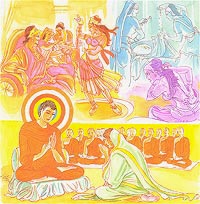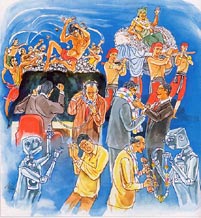

Verse 221. He Who Is Not Assaulted By Sorrow
Anger and pride should one forsake,
all fetters cast aside,
dukkha’s none where no desire,
no binding to body or mind.
Explanation: Abandon anger. Give up pride fully. Get rid of all clingings. To that person, who is not attracted to name and form, and is free of appendages, no suffering befalls.

Verse 222. The Efficient Charioteer
Who checks arising anger
as with chariot away,
that one I call a charioteer,
others merely grip the reins.
Explanation: That person who is capable of curbing sudden anger is like the expert charioteer who restrains a chariot rushing out of control. That person I describe as a true charioteer. The other charioteer is a mere holder of the reins.

Verse 223. Four Forms Of Victories
Anger conquer by amity,
evil conquer with good,
by giving conquer miserly,
with truth the speaker of falsity.
Explanation: Let anger be conquered by love. Let bad be conquered by good. Let miserliness be overcome be generosity. Let the liar by conquered by the truth.

Verse 224. Three Factors Leading To Heaven
Speak truth and be not angry,
from little give to one who asks,
by these conditions three to go
unto the presence of the gods.
Explanation: Speak the truth. Do not get angry. When asked, give even a little. These three factors will ensure that you will reach the deities.

Verse 225. Those Harmless One Reach The Deathless
Those sages inoffensive
in body e’er restrained
go unto the Deathless State
where gone they grieve no more.
Explanation: Those harmless sages, perpetually restrained in body, reach the place of deathlessness, where they do not grieve.

Verse 226. Yearning For Nibbana
For the ever-vigilant
who train by day and night
upon Nibbana e’er intent
pollutions fade away.
Explanation: Of those who are perpetually wakeful – alert, mindful and vigilant – who are given to discipline themselves and studying day and night, intent upon the attainment of Nibbana, the taints and cankers get extinguished.

Verse 227. There Is No One Who Is Not Blamed
An ancient saying, Atula,
not only said today –
‘They are blamed who silent sit,
who often speak they too are blamed,
and blamed are they of measured speech’ –
there’s none in the world unblamed.
Explanation: O’ Atula, This has been said in the olden days too – it is not just for today. They blame the person who remains silent. They find fault with the person who talks too much. Even with the individual who speaks in moderation, they find fault. In this world there is no one who is not blamed.

Verse 228. No One Is Exclusively Blamed Or Praised
There never was, there’ll never be
nor now is ever found
a person blamed perpetually
or one who’s wholly praised.
Explanation: There was never a person who was wholly, totally and exclusively blamed. Nor was there any time a person who was wholly, totally and exclusively praised. And, there will never will be such a person. Even today one cannot find such a person.

Verse 229. Person Who Is Always Praise-Worthy
But those who are intelligent
praise one of flawless conduct, sage,
in wisdom and virtue well-composed,
having observed him day by day.
Explanation: But those whom the wise praise, after a daily scrutiny, are persons whose conduct is blameless, who are intelligent, well endowed with insight and discipline.

Verse 230. Person Who Is Like Solid Gold
Who’s to blame that one so fine
as gem from Jambu stream?
Even the devas that one praise,
by Brahma too is praised.
Explanation: A person of distinction is beyond blame or praise and fault finding – like a coin of pure gold – no one can find fault with such a person. Deities praise him.

Verse 231. The Person Of Bodily Discipline
Rough action one should guard against,
be with body well-restrained,
bad bodily conduct having shed
train oneself in good.
Explanation: Guard against the physical expression of emotions. Be restraint in physical behaviour. Give up physical misconduct. Practice wholesome physical behaviour.

Verse 232. Virtuous Verbal Behaviour
Rough speaking one should guard against,
be in speaking well-restrained,
bad verbal conduct having shed
train oneself in good.
Explanation: Guard against the verbal expression of emotions. Be restrained in your speech behaviour. Give up speech misconduct. Practice wholesome speech behaviour.

Verse 233. Discipline Your Mind
Rough thinking one should guard against,
be in thinking well-restrained,
bad mental conduct having shed
train oneself in good.
Explanation: Guard against the mental expression of emotions. Be restrained in the behaviour of your mind. Give up mental misconduct. Practice wholesome mental behaviour.

Verse 234. Safeguard The Three Doors
Restrained in body are the wise,
in speech as well they are restrained,
likewise are they restrained in mind,
they’re perfectly restrained.
Explanation: The wise are restrained in body. They are restrained in speech as well. They are also well disciplined in mind. They, who have safe-guarded the three doors – body, speech and mind – are supremely restrained.

